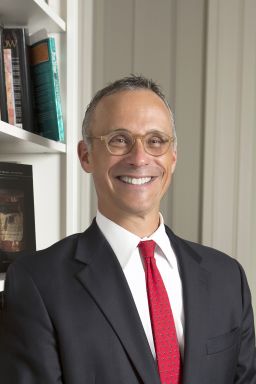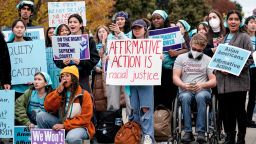Editor’s Note: Michael S. Roth is president of Wesleyan University. Among his recent books are “Safe Enough Spaces: A Pragmatist’s Approach to Inclusion, Free Speech and Political Correctness on College Campuses” and the forthcoming “The Student: A Short History.” The views expressed here are his own. Read more opinion on CNN.
In the wake of the Supreme Court’s decision on affirmative action, higher education must work harder to promote equitable access. One thing that can be done at schools like Wesleyan University, where I am president, is to end preference for legacy applicants. At Wesleyan, this is low-hanging fruit, as we have rarely given such preference. But the time is right for Wesleyan (and other schools, I hope) to make this formal change in policy.

Given the court’s declaration that the country should act as if our society were “race neutral,” selective colleges and universities are changing their approach to admissions decisions. It can’t be said enough that this is not very relevant to most Americans attending college, since the great majority go to schools that admit the majority of those who apply. As a nation we would be well-served by paying more attention to funding public education from pre-K through the college years to better educate working adults as citizens and members of communities.
Economic inequality in America often means educational deficits for millions of children in this country. Providing access to affordable quality education will serve people better than telling them they don’t need so much schooling to slot into the jobs generated by today’s economy.
For better or worse, selective colleges and universities do create certain standards for what counts as a quality education, and almost without exception, these schools today consider a diverse student body important to their mission. People learn more and perform at higher levels when they encounter new people and ideas different from their own. Everyone should be able to agree on this. The disagreement arises over how to achieve that purpose.
Controversies over access to prestigious universities aren’t just about the politics of diversity; they also persist in part because it’s hard to persuade outsiders that the happy few admitted into top-tier institutions really deserve to be there more than the next several thousand potential admits. Ivy League tour guides have been known to share how many applicants with perfect standardized test scores are rejected each year.
Messages such as these are two-fold: one, “look how many brilliant people are trying to get into this wonderful place,” and two, the ultra-selective master chefs in the admissions office know that the first-year class will be more interesting and productive if not everyone in it is test-perfect. At a number of selective liberal arts colleges, such as the ones where I have spent most of my career, entering classes have fewer than 1,000 students and most of the many thousands who apply are capable of doing the work at a reasonably high level.
That so many qualified applicants are not selected naturally leads to suspicion about those fortunate ones who are. For many rejected candidates and their families, affirmative action policies have been an easy target for venting their disappointment.
The large majority of those who apply to Wesleyan are qualified to do the work here, and so the choice of whom to accept is challenging. More than 50 years ago, Wesleyan began working toward having a much more diverse student body, and this meant that a smaller percentage of students would be coming from those groups traditionally associated with schools like ours: a small percentage of White, Protestant men from New England. We expanded the pool. Over the years, we’ve found that an applicant’s connection to one of our graduates indicates little about that applicant’s ability to succeed at Wesleyan, and so legacy status has played a negligible role in our admissions process for a long time.
Nevertheless, ending any preference for legacy applicants sends an important message at a pivotal time. We still value the ongoing relationships that come from multi-generational Wesleyan attendance, but family members of alumni will be admitted on their own merits.
Most highly selective colleges, including Wesleyan, take an individualized, holistic view of an applicant’s lived experience— expressed in their college essay, shown by their high school record and letters of recommendation and reinforced through interactions with representatives of the school. We look closely at an applicant’s individual’s history, considering their talents and potential to contribute to our community, while getting the most out of the education offered here. There simply is no one factor that could ever guarantee (or proscribe) admission.
In many ways, ending preferential legacy admission is the easy part. The hard part comes with fostering a variety of ways to achieve diversity in our student body. We are committed, for instance, to geographic diversity, pursued by recruiting efforts in rural America, and we have launched the Wesleyan African Scholars Program to recruit and support a group of undergraduates from Africa each year (we will welcome our first class of students, hailing from nine different countries on the continent, this fall).
We will strengthen our outreach to community-based organizations, college access programs and Title I high schools, which receive federal support in the absence of robust state or local funding. We will continue to build a durable pipeline of community college graduates and veterans interested in a liberal arts education. We will also ensure the sustainability of Wesleyan’s Center for Prison Education, a degree program for incarcerated people in Connecticut prisons, which already has yielded life-changing results.
It’s news to nobody that a liberal education is expensive. Small classes, with access to faculty and research support, constitute a major financial investment, and we are committed to increasing aid and support by meeting the full demonstrated need of all students while keeping loans to a minimum. Wesleyan also has a three-year bachelor’s program for those trying to save money by moving through the curriculum more rapidly, an option we will continue to invest in for students who are seeking to reduce the cost of college.
For many years now, Wesleyan has used Coursera to offer classes free of charge, and more recently, we have partnered with The National Educational Equity Foundation to provide free classes for credit in high-poverty high schools around the country. We will develop these options more fully, with the goal of eventually allowing students who may never set foot on the Wesleyan campus to complete a year of college online or in hybrid mode.
Wesleyan University is a small school. But we take pride in graduating students who will have an impact disproportionate to our numbers as they shape a changing world. Our renewed commitment to equitable and forward-thinking admissions processes is made in that spirit. I hope that many American colleges and universities will use their resources to do much the same, by ending legacy preferences and expanding access to their educational programs.





